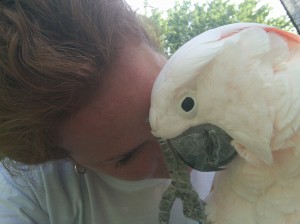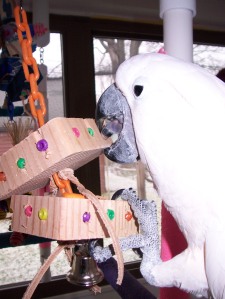
It’s easy to do…it’s easy to get wrapped up in the daily lives of taking care of our bird(s). Change waters, fresh food, fresh veggies, new toys, stuffing foraging toys, time outside of the cage, making sure they get time to with the ones they love, making sure they have enough exercise, vet checks, nail trims, etc. No one said birds were easy to take care of. There is a lot of detail to pay attention to and it’s not easy keeping such intelligent minds occupied.
I hear from parrot owners that don’t have the time to sit and relax. They don’t have the time they would like to spend with loved ones. They don’t take the time to make sure they spend on themselves. It is easy to do, I know. This can be stressful on the parrot owner, the parrots, the family, the spouses, and most of all on you.
I’ve been there. I’ve been so wrapped up in training birds, flying birds, enriching birds, working with nocturnal birds, dreaming about birds, and leaving town for extended periods of time to work with other birds. I’ve realized this and it’s not fair to the others in the household which need or want your time also. It’s not fair for you to not take care of yourself either and this can have a great effect on the birds.
I intentionally take the time to take vacations, take certain days of the week and do things for myself, with my family, and with my spouse. It makes for a healthy balance in life and healthy time for ourselves also proves beneficial for the birds we take care of. Coming home rejuvenated and with a clear mind, even if it is just for a day or an afternoon, can really be beneficial for the birds.
Someone sent me an e-mail recently saying they envied that I could take off out of town for a couple of days at a time. As we dove deeper in conversation, I encouraged this person to begin doing the same. It’s healthy and mentally rejuvenating. This person said they would never trust anyone else with their birds. I encouraged this person to begin picking out a few people they thought they could trust to stop in once or twice a day to check on the birds. Then begin leaving the house on some personal time, even if it is for six hours one day a week. They mentioned that this would be doable. Then try it a few other times throughout the week. Stock the bird’s cages with foraging toys and different enrichment toys. The variety in toys and goals in foraging creates environments for them that are full of choices. When we get stuck in a rut in thinking our birds need our full attention all the time, we begin shaping their behavior of becoming extremely dependent on us. This isn’t healthy for them and it isn’t healthy for us. We begin falling into routines with our birds that force us to stick to them because if these routines are broken, it becomes very stressful for the bird. We train this! By doing this, we are training our birds to become very dependent on us. Routines are nice to a certain extent because it makes things easy for us to remember to make sure we don’t forget to do them. Routines can be unhealthy also because when certain things happen in life that cause us to break them, it causes a lot of stress for all people and birds involved.
Start mixing up schedules. This is what I do. My birds aren’t always fed at the same time every day. My birds aren’t always fed their fresh fruit and veggies in the morning. Foraging toys are stocked the night before and food is always in their cages or on play stations if they decide to eat or forage. The delivery of their fresh fruits and veggies always varies. Sometimes I’ll deliver them at 10 in the morning. Sometimes it is at noon, sometimes it is at three in the afternoon, and sometimes I feed them these at dinner time. There is no routine for them to rely on and there is no routine to cause them stress or anxiety when that routine is broken. As I said before, food is in their cages at all times, the delivery and presentation varies. Predictability can cause boredom. Studies prove this.
I don’t always get my birds out of their cages at ten in the morning. Sometimes I get them all out at noon. Sometimes I get two out at eleven in the morning while leaving the others in foraging and exploring their cages. Sometimes one goes in the back bird room, sometimes three of them go in the back bird room. Sometimes two are in the living room with me while one goes in another bird’s cage and the other two are in another bird room. I know we all don’t have the opportunity to be this flexible throughout the day, but if you put some thought into it, there is a way to provide variety in daily schedules and in smaller time restrictions.
Routines also help birds become over bonded to certain people. It is easy to do. When I have family or visitors over to my house, I’ll ask them to go say ‘hi’ to the birds and hand them a nut or drop a treat into a foraging toy. I encourage them to interact with them verbally. So many times I see people not allow people over to the house because it is either too stressful for the birds or too stressful for the visitors. This is when we are allowing the birds to train us and this is also how many behavior issues are formed with our birds.
So there are two messages here in this post. Take the time for yourself. It is so important. Also, be careful on leaning on routines heavily with

our birds. It can cause stress, anxiety, and boredom with the birds. If your birds aren’t foraging for their food, really take the time into seeing how to incorporate this into their lives. It keeps their minds occupied while we are gone from the house, from their sides, or for a few days. Foraging toys helps in giving them goals and puzzles to solve, tasks to accomplish, and incorporates more choices in their environments. Keep their puzzles solvable though. If they aren’t, they can induce stress and frustration on the bird. If their mind’s are occupied and busy, that is time that they are spending not becoming over dependent on you.
When I come home from being gone for a few days, I am so excited to see my birds and they are so excited to see me. My mind is refreshed
and cleared and ready to get back to bird business and I usually have a few great ideas in mind for things to provide to them. When I have to or want to take off for a day again in the future, the birds get used to this and it is not stressful on them when that time comes. It always brings a smile to my face when I see a bird choose to go back into its cage to interact with a toy. This also helps me rest in knowing that when I leave the house, they are occupied and continuing to learn from their environments inside their cage and verbally interacting with one another.
Leave a Reply